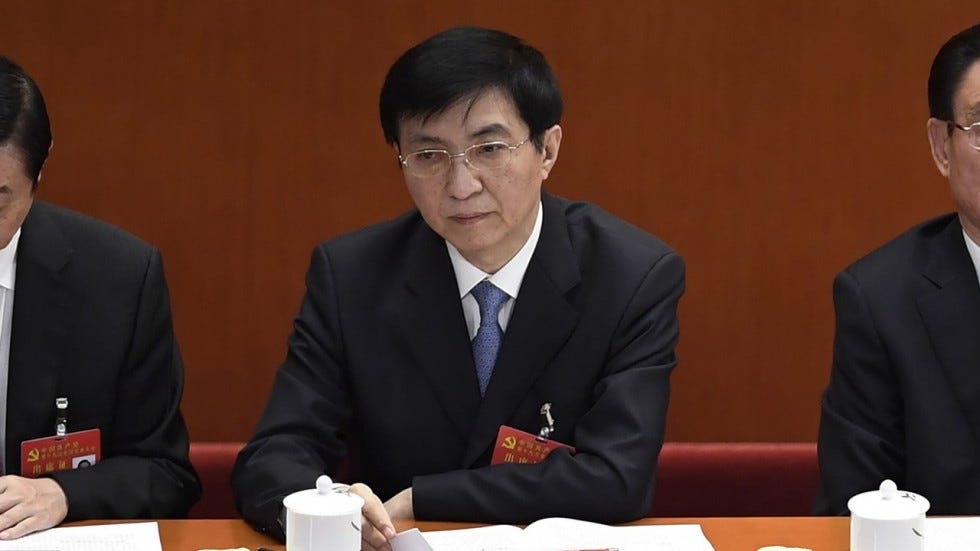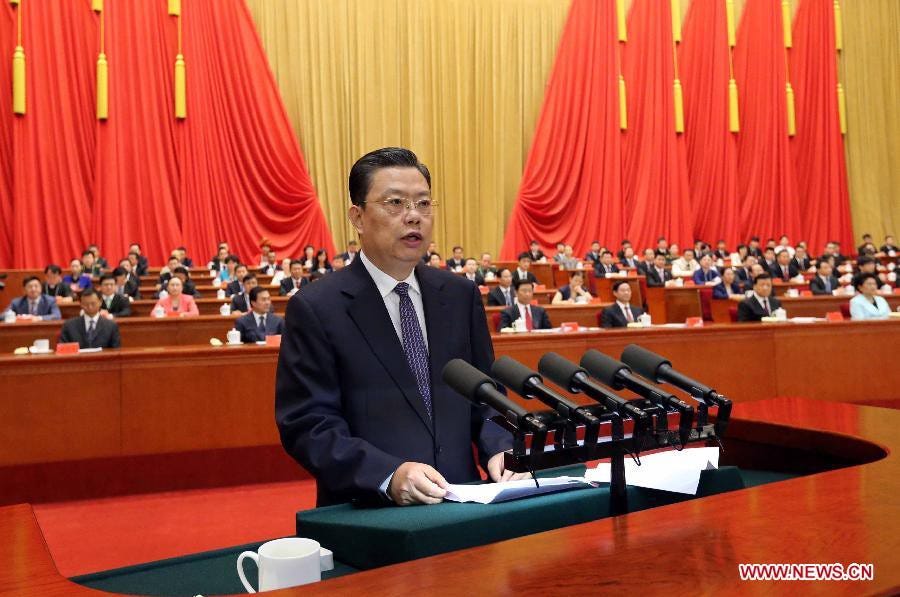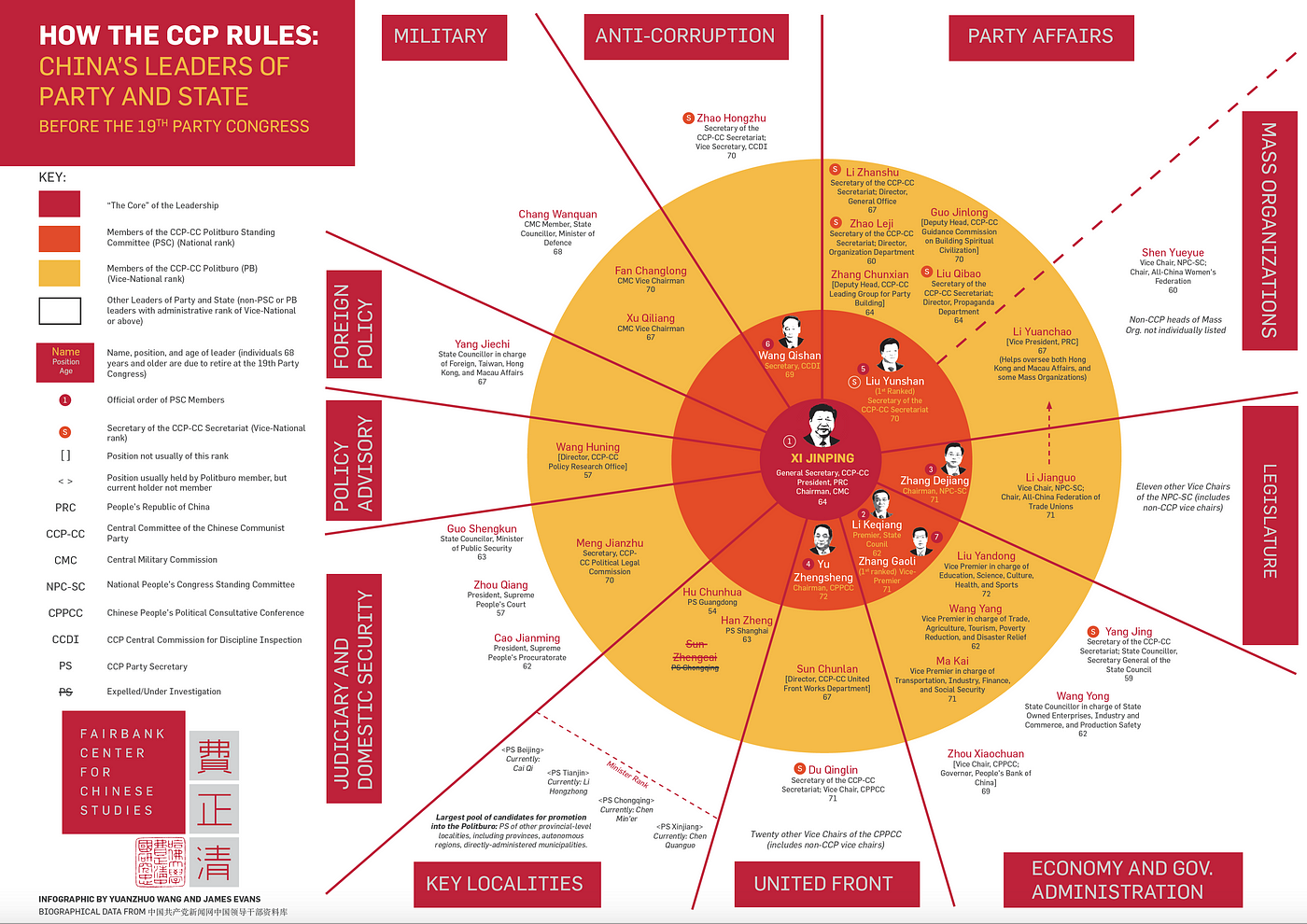The Fairbank Center for Chinese Studies presents a visual guide to China’s leadership after the “Two Meetings” of March 2018, and the new leaders’ ties to Xi Jinping. By Yuanzhuo Wang, Research Associate at Harvard Business School, and James Gethyn Evans, Communications Officer at the Fairbank Center.

Between March 3 and March 20, 2018, the 13th National People’s Congress (NPC) and 13th Chinese People’s Political Consultative Conference (CPPCC) held their respective first sessions in Beijing.
The PRC constitution was amended during the NPC session to, among other things, remove presidential and vice presidential term limits, enshrine Xi Jinping’s eponymous ideology, and emphasize that the “leadership of the Communist Party of China is the most fundamental characteristic of socialism with Chinese characteristics.”
On March 17, after being unanimously re-elected President of the PRC by the NPC, Xi Jinping became the first ruler of Mainland China to take an oath of office to uphold the national constitution since Chiang Kai-shek in 1948. Other leaders also took oaths to uphold the constitution after being elected.
Since 2012 and especially since 2017, many leaders with personal ties or career overlaps with Xi Jinping have been promoted to the top ranks of the national leadership. The ties between certain leaders and Xi Jinping before he became CCP General Secretary in 2012 are visualized in the small grey boxes in the infographic. They indicate a leader’s ties to Xi Jingping through his home province of Shaanxi, his early life in Beijing, or career overlaps in Hebei, Fujian, Zhejiang, Shanghai, or the CCP-CC Secretariat. This information was sourced from the leaders’ published resumes, as well Cheng Li’s book Chinese Politics in the Xi Jinping Era, which is very informative on leaders’ significant ties to Shaanxi and to Xi’s early life.
With the exception of Wang Qishan, the most powerful newly-elected state leaders became members of the CCP’s Politburo Standing Committee (PSC, depicted in orange on the infographic), Politburo (PB, depicted in yellow on the infographic), or Secretariat (marked with an “S”) in October 2017.
Some members of CCP bodies were not elected to state offices, but oversee state leaders in their CCP assigned areas of responsibilities. Together with other state leaders of vice national rank and above they constitute China’s “leaders of party and state” (党和国家领导人) and govern the country under (or around) the “Core” of the leadership — Xi Jinping — through the institutions they oversee or CCP policy coordinating commissions and “leading groups” they chair or manage.
After the NPC, several “leading groups” (领导小组), specifically on comprehensively deepening reform (全面深化改革), finance and economics (财经), foreign affairs (外事), and internet security and informatization (网络安全和信息化), were upgraded or are being upgraded to policy coordinating “commissions” to ensure “centralized and unified leadership” (集中统一领导) of the party and “top level design” of policy (顶层设计). Other commissions or leading groups are being created on “comprehensively governing the country by law” (全面依法治国), auditing, and education.
Instead of retiring as expected, Wang Qishan, who was unable to retain CCP-CC membership and his PSC seat because he was over the retirement age, was elected Vice President of the PRC. Seating arrangement and media protocol during and after the NPC session, which showed Wang after current PSC members but before PB members, indicated that Wang retained his national-rank as a former member of the PSC, despite having stepped down from his formal position in the party leadership.
For more information on each leader’s portfolio of responsibility and the institutions through which they exercise power, see descriptions below:
Party Affairs
PSC Member in Charge: Xi Jinping 习近平, Wang Huning 王沪宁
Lead Organ: CCP Central Committee Secretariat (中共中央书记处)

The CCP-CC Secretariat coordinates the day-to-day governance of the central party apparatus and reports to the General Secretary and the PSC. Wang Huning 王沪宁, PSC member and First-Ranked Secretary of the Secretariat, currently heads the body.
Between 2012 and 2017, the First-Ranked Secretary of the Secretariat oversaw the following offices:
- CCP-CC General Office: administrative and internal communications center of the CCP
- CCP-CC Organization Department: controls party and government personnel evaluations and appointments above vice-minister/vice-governor rank; recently absorbed the State Administration of Civil Service, which was charged with the recruitment and evaluation of civil servants in China
- CCP-CC Propaganda Department (or Publicity Department): controls the state media, promotes the party’s agenda, and enforces censorship; recently absorbed State Council offices regulating publications, films, and copyright
Unlike other recent First-Ranked secretaries, however, Wang Huning only appears to have direct oversight over ideology and propaganda. Wang, a former academic, also retained his position of Director of the CCP-CC Policy Research Office, which drafts key party policy documents.
The propaganda system under Wang also has oversight over the Cyberspace Administration of China (CAC), managed by a minister-rank Vice Director of the CCP-CC Propaganda Department. The CAC also report to the CCP-CC Leading Group on Internet Security and Informatization, which is chaired by Xi Jinping. The leading group is being upgraded to a commission and will continue to control access and enforce censorship on the Chinese internet.
Chen Xi 陈希, PB member, Secretary of the Secretariat, and Director of the CCP-CC Organization Department took over the position of President of the Central Party School, a position held by the First-Ranked Secretary of the Secretariat or another PSC member since 1989. He seems to have become Xi Jinping’s point person on party organization and personnel. Ding Xuexiang 丁薛祥, Xi’s chief of staff, heads the CCP-CC General Office.
Other Secretaries of the Secretariat reporting to other PSC members (described in other sections) include:
- First-ranked Vice Secretary, Central Commission for Discipline Inspection (CCDI)
- Secretary, CCP-CC Political and Legal Affairs Commission
- Director, CCP-CC United Front Work Department
Legislature
PSC Member in Charge: Xi Jinping 习近平, Li Zhanshu 栗战书
Lead Organ: Standing Committee of the National People’s Congress (NPC-SC) (全国人大常委会)

The NPC-SC interprets and amends the PRC’s constitution, drafts and passes legislations, and elects national leaders. Li Zhanshu 栗战书, who ranks 3rd on the PSC, was elected to chair the body.
Through its powers to interpret the Hong Kong and Macau Basic Laws, the NPC-SC also plays an important role in Hong Kong and Macau affairs, the specifics of which are handled through the CCP-CC United Front Work Department and the Hong Kong and Macau Office of the State Council.
The NPC-SC has fourteen vice chairs consisting of officials in semi-retirement who provide advice and expertise on legislation, representatives of key ethnic minority groups (one Uighur, one Tibetan), heads of mass organizations, and heads of CCP approved “democratic parties”.
Members of the NPC-SC (i.e. legislators) also include many former senior officials (e.g. former State Council ministers or provincial party secretaries and governors) who have “retired to the second line” (退居二线).
Mass Organizations
PSC Member in Charge: Xi Jinping 习近平, Wang Huning 王沪宁
Lead Organ: PSC/PB member overseeing mass organizations

The First-Ranked Secretary of the CCP-CC Secretariat oversees mass organizations at the PSC level with one PB member assisting. The CCP use “mass organizations” to manage relationships with various socio-economic/professional groups.
Heads of mass organizations are usually minister-ranked (and therefore not shown on the infographic), unless they concurrently serve as Vice Chair of the NPC-SC, such as Shen Yueyue 沈跃跃, the Chairwoman of the All-China Women’s Federation and Wang Dongming 王东明, Chairman of the All-China Federation of Trade Unions.
It is unclear so far which (if any) PB member will be assigned to oversee mass organizations under the supervision of Wang Huning.
Economy and Public Administration
PSC Member in Charge: Xi Jinping 习近平, Li Keqiang 李克强, Han Zheng 韩正
Lead Organ: State Council (国务院), CCP-CC Commission on Finance and Economics (中共中央财经委员会)

The State Council is the executive arm of the Chinese government. It is headed by a Premier, who is assisted by several Vice Premiers and State Councilors (i.e. junior Vice Premiers) each overseeing several ministry-level entities (or in the case of some State Councilors, one key ministry-level entity) that regulate different sectors of the economy or handle other state affairs.
Li Keqiang, ranking 2nd on the PSC, is the current Premier, while Han Zheng, ranking 7th (last), is the First-Ranked Vice Premier. Other Vice Premiers are PB members and State Councilors are usually CCP-CC members.
The Premier’s traditional role as chief economic manager has been eroded under Xi Jinping’s leadership. CCP policy coordinating groups play key roles in the formulation of policy often under the direct leadership of Xi. In the realm of economic policy, the CCP-CC Leading Group on Finance and Economics has been key and has been upgraded to a commission.
The new CCP-CC Commission on Finance and Economics is chaired by Xi with Premier Li Keqiang serving as vice chair. Members include the First-Ranked Secretary of the CCP-CC Secretariat and the executive Vice Premier. Other members should include other Vice Premiers, key ministers, governor of the People’s Bank of China (China’s central bank).
Liu He, newly appointed Vice Premier with reputation as Xi Jinping’s most trusted economic adviser, headed the office of the former leading group, which managed its day-to-day activities. Despite being the most junior Vice Premier in terms of seniority, Liu may continue to play a leading role on the new policy coordinating commission while serving as its office director (this is yet to be officially confirmed).
Another CCP policy coordinating body, the CCP-CC Leading Group on Comprehensively Deepening Reform, which coordinates key reform policies, was also upgraded to a commission. The office of the former leading group was located at the CCP-CC Policy Research Office. The commission is chaired by Xi; Li Keqiang, Wang Huning, and Han Zheng serve as vice chairs. The commission has significant influence over economic reform.
United Front
PSC Member in Charge: Xi Jinping 习近平, Wang Yang 汪洋
Lead Organ: National Committee of the Chinese People’s Political Consultative Conference (CPPCC) (全国政协), CCP-CC United Front Work Department (中共中央统战部)

“United front work” (统一战线工作) in China, under the slogan of “uniting all forces that can be united” (团结一切可以团结的力量) in service of the CCP, manages the CCP’s relationship with non-CCP organizations and individuals. This includes important ethnic minority leaders, religious leaders, CCP-friendly political and business leaders of Taiwan, Hong Kong, Macau, and overseas, and other social influencers in China, such as actors, singers, and athletes.
The CCP-CC Central United Front Work Department is the party organ managing united front work while the CPPCC hosts the “targets” of united front work. Members of the CPPCC provide (non-legally binding) advice on party and government policy and are expected to unite the social elements they represent around the CCP’s agenda.
Wang Yang 汪洋, 4th ranking PSC member, was elected to chair the CPPCC.
The Director of the CCP-CC United Front Work Department is the only Secretary of the CCP-CC Secretariat without PB membership.
The powers of the CCP-CC United Front Work Department is being expanded. It has taken over oversight of the State Ethnic Affairs Commission under the State Council and has absorbed the functions of the State Religious Affairs Administration and State Council Overseas Chinese Affairs Office.
Like the vice chairs of the NPC, vice chairs of the CPPCC include many senior officials in semi-retirement, some of whom are ethnic minorities and leaders of “democratic parties” or mass/social organizations. They also include current leaders of the CCP’s united front organs (e.g. Vice Director of the CCP-CC United Front Work Department and Minister of the State Ethnic Affairs Commission Bagatur), former chief executives of Hong Kong and Macau, and State Council ministers needing a rank-boost to put off pending retirement (e.g. Minister of the National Development and Reform Commission He Lifeng).
Supervision and Anti-Corruption
PSC Member in Charge: Xi Jinping 习近平, Zhao Leji 赵乐际
Lead Organ: CCP Central Commission for Discipline Inspection (CCDI) (中共中央纪律检查委员会), National Supervision Commission (国家监察委员会)

The CCDI enforces “party discipline” and has power to detain and investigate party members for any number of suspected “disciplinary violations”, including corruption. Under former Secretary Wang Qishan 王岐山, the CCDI sent “inspection teams” into other government agencies and localities to conduct investigations as part of Xi Jinping’s feared anti-corruption campaign.
Zhao Leji 赵乐际, 6th ranked member of the PSC, was elected to head the CCDI in October 2017.
Constitutional amendments introduced at the first session of the 13th NPC created a National Supervision Commission, which will share offices with the CCDI and extend its powers to supervise all public sector employees (for example, teachers and doctors) regardless of party membership.
The National Supervision Commission is chaired by a Politburo member who is the First-Ranked Vice Secretary of the CCDI and who is senior to the country’s top judge and prosecutor.
Judiciary and Domestic Security
PSC Member in Charge: Xi Jinping 习近平
Lead Organ: CCP-CC Political and Legal Affairs Commission (PLAC) (中共中央政法委员会)

“Political legal work” (政法工作) covers:
Law enforcement and domestic security: through the Ministry of Public Security under the State Council, which controls the country’s police force.
The court system: through the Supreme People’s Court (SPC).
State prosecutors: through the Supreme People’s Procuratorate (SPP).
State security: through the Ministry of State Security under the State Council.
Judicial administration: through the Ministry of Justice under the State Council, which regulates lawyers, legal education and accreditation, judicial appraisal bodies, the prison system, and other correctional facilities; it recently absorbed additional responsibilities to draft legislations on behalf of the government; the Ministry of Justice will host the office of the new CCP-CC Commission on Comprehensively Governing the Country by Law
The heads of the SPC and SPP are “elected” by the NPC and legally report to the NPC or the NPC-SC. In practice, they are members of the CCP-CC PLAC and are overseen by its Secretary.
Most Secretaries of the PLAC (including the current one) are promoted from Minister of Public Security in recent years. The Minister of Public Security often serves as Vice Secretary of the PLAC and is more senior to the country’s top judge and prosecutor on the commission.
Guo Shengkun 郭声琨, the current Secretary of the CCP-CC Political Legal Commission (PLC) is also a Secretary of the CCP-CC Secretariat, highlighting the importance of the domestic security portfolio. The PLAC recently absorbed several other CCP offices overseeing social stability and social governance.
Other CCP policy-coordinating organs, such as the CCP Central National Security Commission (headed by Xi Jinping), may also influence domestic security policy.
Foreign Policy
PSC Member in Charge: Xi Jinping 习近平
Lead Organ: CCP-CC Foreign Affairs Work Commission (中共中央外事工作委员会)

As head of the CCP-CC Leading Group on Foreign Affairs, Xi Jinping has direct oversight over foreign policy.
Newly elected Vice President Wang Qishan, who managed trade and finance during the 2007–2008 financial crisis as a Vice Premier before being promoted to PSC member and Secretary of the CCDI, is also expected to play a leading role in foreign affairs.
The former CCP-CC Leading Group on Foreign Affairs was upgraded to a commission. Yang Jiechi 杨洁篪, who gained a Politburo seat in 2017 and headed the office of the former leading group, continued to serve as the office director of the new commission. Foreign Minister Wang Yi was promoted to State Councilor, giving the foreign policy establishment another vice-national rank official.
Other CCP policy coordinating organs, such as the CCP-CC National Security Commission, may also influence foreign policy.
Military
PSC Member in Charge: Xi Jinping 习近平
Lead Organ: Central Military Commission of the CCP-CC and of the PRC (CMC) (中共中央军事委员会/中华人民共和国军事委员会)

As the Chairman of both the Central Military Commission (CMC) of the CCP and the PRC, Xi Jinping has direct oversight over military affairs. Xi has streamlined the military’s organization and command structure to give the CMC more direct control over the military, and to improve joint-operation capabilities of the People’s Liberation Army (PLA).
Since 1997, the two highest ranking officers of the PLA have also served on the PB. Generals Xu Qiliang 许其亮 (Air Force) and Zhang Youxia 张又侠 (Army) now fill these roles on the 19th Politburo as Vice Chairmen of the CMC.
Four other military leaders serve as members of the CMC:
General Wei Fenghe 魏凤和 (Rocket Force), State Councilor, Minister of National Defense
General Li Zuocheng 李作成 (Army), Chief of Staff of the CMC Joint Staff Department
Admiral Miao Hua 苗华 (Navy), Director of the CMC Political Work Department
General Zhang Shengmin 张升民 (Rocket Force), Vice Secretary of the CCDI, Secretary of the CMC Discipline Inspection Commission
Key Localities

The Communist Party Secretary (PS) is the highest ranking official of a locality, while the local head of government (the governor or mayor) is the PS’s deputy. The PSs of key localities add local perspectives to central policy-making and help with policy implementation in their geographic areas.
The PSs of the four directly administered municipalities (Beijing, Shanghai, Tianjin, Chongqing), the economic powerhouse province of Guangdong, and the strategically important autonomous region of Xinjiang are currently staffed by Politburo members.
Download the full-sized infographic from the Fairbank Center’s website.
China’s Leadership From before the 13th National People’s Congress:
See our previous blog posts and infographics for a brief overview of the China’s leadership changes during the 19th Party Congress, as well as the leadership before the 19th Party Congress.

Infographics and analysis by Yuan Wang, Research Associate at Harvard Business School, and James Evans, Publications Coordinator at the Fairbank Center for Chinese Studies.

